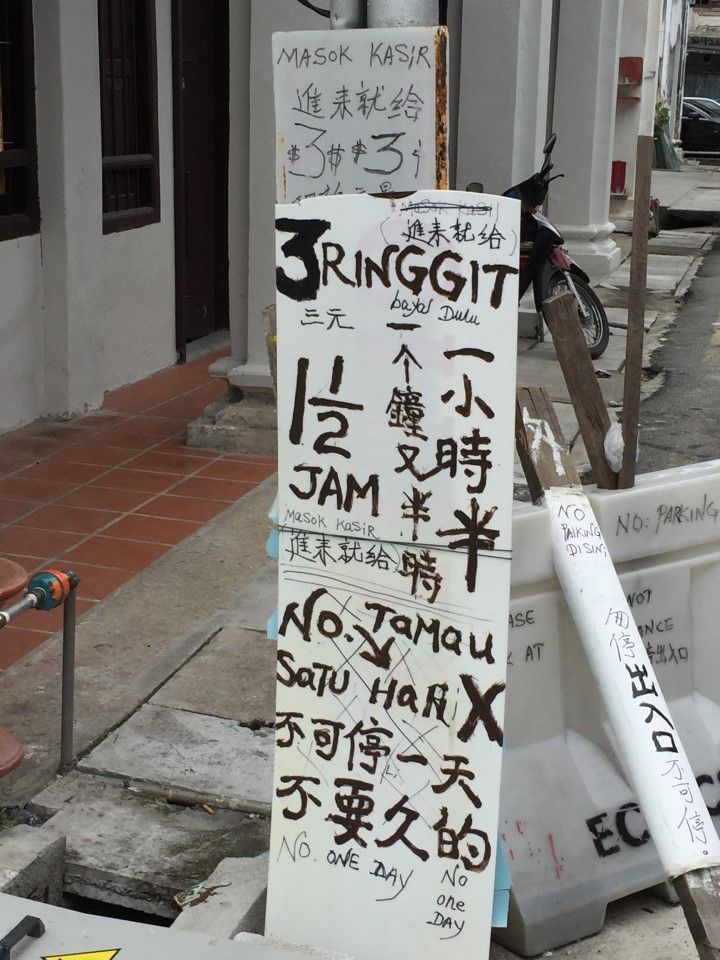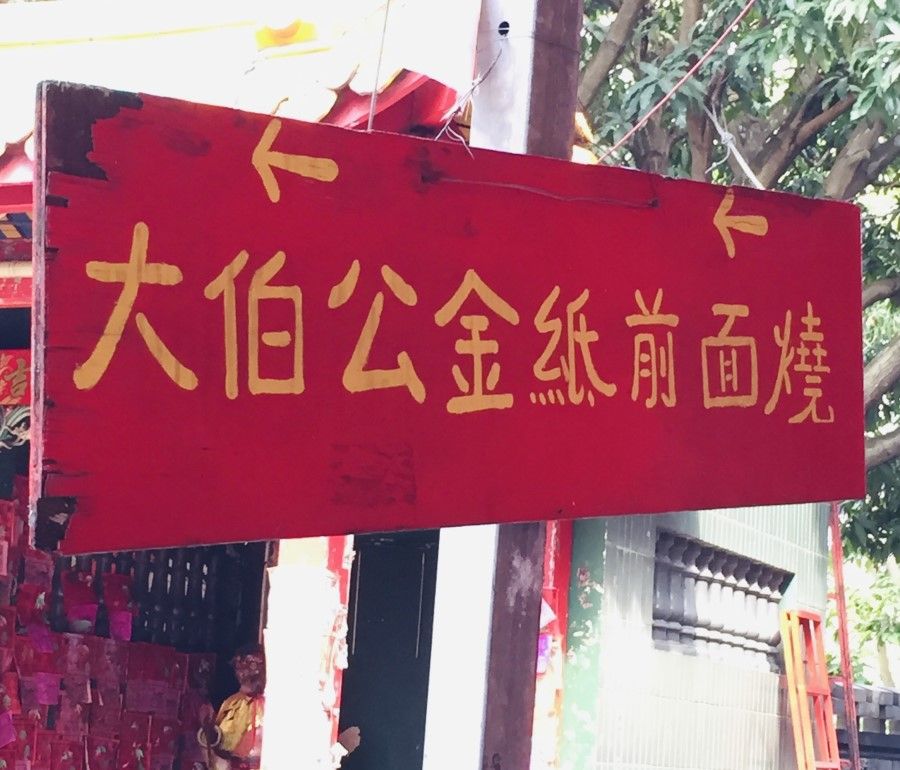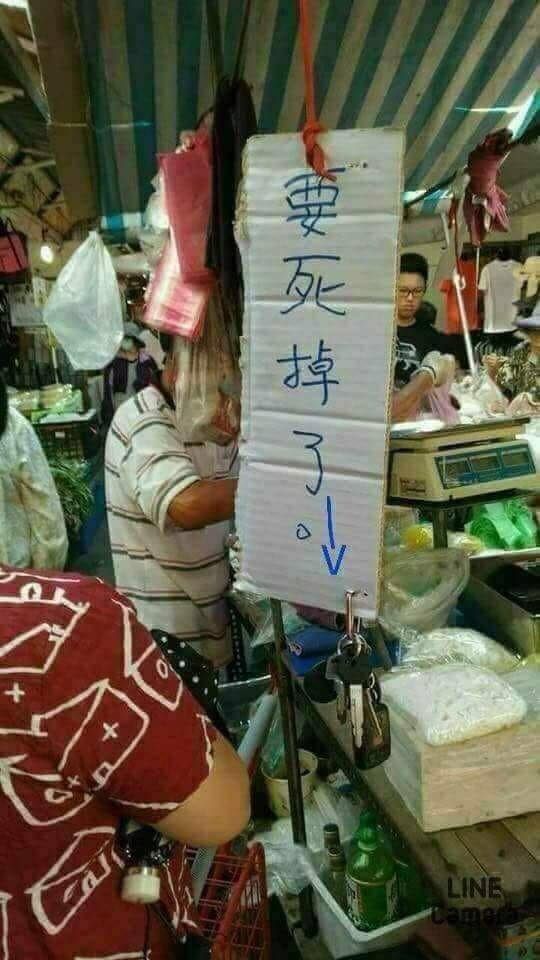Of butt lumps, stomachs and heads: Chinese language of the common folk

Four years ago at the height of summer, I went on an impromptu trip to Malaysia. I chanced upon a street lamp with three lines in Chinese explaining the parking fees. "Come in give three dollars/One hour and half time/Cannot park whole day, cannot long." It was an unsophisticated method of expression and an interesting exercise in comprehension.
"Come in give three dollars" is clear enough, fuss-free and to the point, meaning "three dollars per entry". As for how long one can park with three dollars, the next line is more challenging for the punctilious among us; don't be confused by "half time" (半时), which in the Chinese dictionary actually means half of a two-hour period used in ancient China (时辰), meaning one hour. But that did not seem to fit what the car park owner meant. In an instant, I caught sight of the Malay words "1½ jam", and understood that it meant one and half hours.

The third line: "Cannot park whole day, cannot long." That is the undisguised language of the common people, like meeting an old neighbour after a long time. "Cannot long" - how long is "long"? Can one only park here for 90 minutes each time? Or does three dollars allow 90 minutes of parking, with additional charges after? On further thought, it could mean anything.
Incense-filled temples mostly serve the believers at the bottom of the pyramid - everyone understands "Tua Pek Kong gold paper in front burn".
Not necessarily grammatical, but everyone understands
One particular year of the Dragon, I went with my family to a temple in the west of Singapore to pray to the Tiger God. Walking around amid the incense and smoke, I saw an amusing line in Chinese: "Tua Pek Kong gold paper in front burn".
You can probably figure out what it really means. "Gold paper" refers to incense paper, and the line means that if believers want to burn incense paper to Tua Pek Kong the deity, they should keep going up ahead.
The proper means of expression would be to just draw an arrow and write "Burning area" or "To incense burners", and all would be clear. Or perhaps that would be like wearing a Western suit to pray in a temple to the Earth God: a total misfit. Incense-filled temples mostly serve the believers at the bottom of the pyramid - everyone understands "Tua Pek Kong gold paper in front burn".

Once in a supermarket, a customer asked a staff member about a product on offer. The staff continued stocking the shelves as they said in Chinese: "Every time come then no more already." The item arrives, and then there is "no more" - it is all sold out. Picking on the flaws of the language of common folk would make life uninteresting.
I went with a friend nicknamed Potato Lim to the coffeeshop for tea. He ordered drinks at the counter, then came back. Soon after, the coffeeshop staff came by with a tray full of drinks, cocked his head and asked in Chinese: "Yours is what? Quick say!"
For Potato Lim, such a boorish way of expression was common and crass. He then related an incident at a void deck of a HDB flat, where a woman had been stabbed by a man. An elderly woman who passed by shouted in Chinese: "Da Jingcha! Da Jingcha" (打警察 could mean punch police or call police.) Lim was stunned - what mad person would instigate people to assault the police? When he was more settled, he realised the elderly woman meant for someone to "call the police".
As long as one frequents the alleys and lanes and comes into contact with the common people, such language that lifts the mood is easily heard. A second-generation boss of a beef noodle store tells his regular customers that beef "cannot be cooked to 100%", meaning that the beef cannot be well done or cooked through. He said being a hawker is tough, and every day he has to "wash stomach" (referring to the cow's stomach), which is actually quietly satisfying for locals to hear.
Two "butt lumps" - how juicy! Does that not ease your high-strung nerves?
Cutting to the chase
Today, in the markets or alleys, colloquialisms like "behind, hot" (watch out, hot item behind you) or "this fish is beautiful" (this fish is fresh) sound half-baked, but clear language quirks seep through, with the boldness to live out its own flavour. The common people just want the meaning to be conveyed, and communication achieved.
And as I write, a rascally friend of mine has sent me an audio clip of an exchange he heard on the radio, where a listener described how she was on a bicycle for an hour, and her "two butt lumps almost fell off". Two "butt lumps" - how juicy! Does that not ease your high-strung nerves?
It said in Chinese: "Please have your temperature taken with your head. If you have no head, use your hand." Oh my head, such nonsense!

I remember many years ago, a teacher brought some Singaporean children to Shanghai, and one of the programmes was taking public transport. The children boarded a bus and gave the money to the driver, who pointed at a money box on the side and said in proper China Mandarin: "Put it in, put it in." Except he said 投 (tou), which sounds the same as 头 (tou, head), and it sounded like he was telling the children to put their heads into the box. One child touched his head and asked the teacher: "What's wrong with my head?"
In the early days of the pandemic, when people were required to have their temperature checked, stores put up notices, at least one of which the media thought was funny. It said in Chinese: "Please have your temperature taken with your head. If you have no head, use your hand." Oh my head, such nonsense! If one had no head, could one use their hand?
Once at a market in the west of Singapore, I saw that a stallholder had written on a piece of cardboard in Chinese: 要死掉了 (yao si diao le, "about to die"). It hung at the stall, swaying in the wind, with a bunch of keys attached. The stallholder had riffed on the Chinese 钥匙掉了 (yao shi diao le, "keys dropped"). If you walked by, you saw the words and froze, then smiled, and the dreariness of life was lifted and enlivened.
This article was first published in Lianhe Zaobao as "草根语言".
Related: What old Chinese textbooks say about life and times in Singapore | How the 'tree' of Chinese writing united dialects, culture and people through the millennia | How the Shanghai Book Company enlivened Singapore's cultural scene | Trees in a forest: Becoming Chinese Singaporean in multicultural Singapore | What does multiculturalism mean in Singapore?
